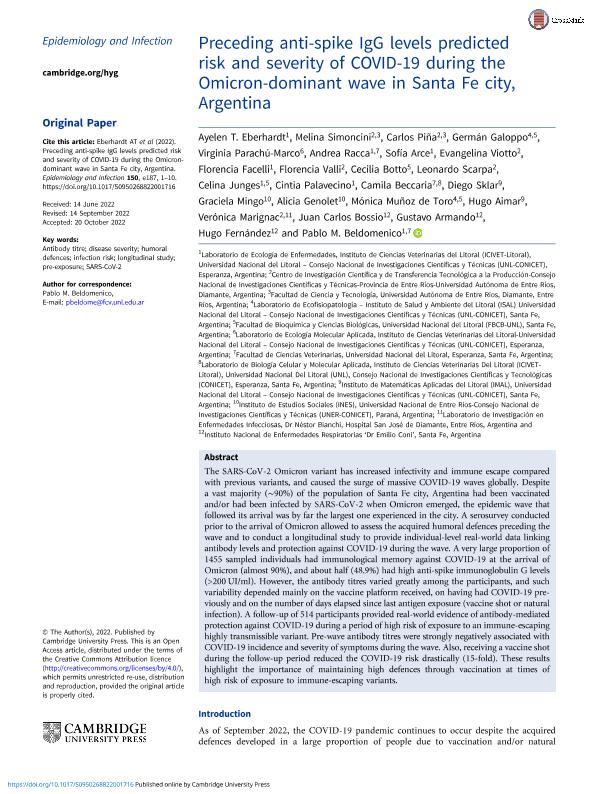Artículo
Preceding anti-spike IgG levels predicted risk and severity of COVID-19 during the Omicron-dominant wave in Santa Fe city, Argentina
Eberhardt, María Ayelen Teresita ; Simoncini, Melina Soledad
; Simoncini, Melina Soledad ; Piña, Carlos Ignacio
; Piña, Carlos Ignacio ; Galoppo, Germán Hugo; Parachu Marco, Maria Virginia
; Galoppo, Germán Hugo; Parachu Marco, Maria Virginia ; Racca, Andrea Laura
; Racca, Andrea Laura ; Arce, Sofía Irene
; Arce, Sofía Irene ; Viotto, Evangelina del Valle
; Viotto, Evangelina del Valle ; Facelli Fernández, Florencia
; Facelli Fernández, Florencia ; Valli, Florencia Elizabeth
; Valli, Florencia Elizabeth ; Botto, Cecilia Cristina; Scarpa, Leonardo Javier
; Botto, Cecilia Cristina; Scarpa, Leonardo Javier ; Junges, Celina Maria
; Junges, Celina Maria ; Palavecino, Cintia Carolina
; Palavecino, Cintia Carolina ; Beccaría, Camila
; Beccaría, Camila ; Sklar, Diego Mauricio
; Sklar, Diego Mauricio ; Mingo, Graciela Laura; Genolet, Alicia Susana Guadalupe; Muñoz de Toro, Monica Milagros; Aimar, Hugo Alejandro
; Mingo, Graciela Laura; Genolet, Alicia Susana Guadalupe; Muñoz de Toro, Monica Milagros; Aimar, Hugo Alejandro ; Martinez Marignac, Veronica Lucrecia
; Martinez Marignac, Veronica Lucrecia ; Bossio, Juan Carlos; Armando, Gustavo; Fernández, Hugo; Beldomenico, Pablo Martín
; Bossio, Juan Carlos; Armando, Gustavo; Fernández, Hugo; Beldomenico, Pablo Martín
 ; Simoncini, Melina Soledad
; Simoncini, Melina Soledad ; Piña, Carlos Ignacio
; Piña, Carlos Ignacio ; Galoppo, Germán Hugo; Parachu Marco, Maria Virginia
; Galoppo, Germán Hugo; Parachu Marco, Maria Virginia ; Racca, Andrea Laura
; Racca, Andrea Laura ; Arce, Sofía Irene
; Arce, Sofía Irene ; Viotto, Evangelina del Valle
; Viotto, Evangelina del Valle ; Facelli Fernández, Florencia
; Facelli Fernández, Florencia ; Valli, Florencia Elizabeth
; Valli, Florencia Elizabeth ; Botto, Cecilia Cristina; Scarpa, Leonardo Javier
; Botto, Cecilia Cristina; Scarpa, Leonardo Javier ; Junges, Celina Maria
; Junges, Celina Maria ; Palavecino, Cintia Carolina
; Palavecino, Cintia Carolina ; Beccaría, Camila
; Beccaría, Camila ; Sklar, Diego Mauricio
; Sklar, Diego Mauricio ; Mingo, Graciela Laura; Genolet, Alicia Susana Guadalupe; Muñoz de Toro, Monica Milagros; Aimar, Hugo Alejandro
; Mingo, Graciela Laura; Genolet, Alicia Susana Guadalupe; Muñoz de Toro, Monica Milagros; Aimar, Hugo Alejandro ; Martinez Marignac, Veronica Lucrecia
; Martinez Marignac, Veronica Lucrecia ; Bossio, Juan Carlos; Armando, Gustavo; Fernández, Hugo; Beldomenico, Pablo Martín
; Bossio, Juan Carlos; Armando, Gustavo; Fernández, Hugo; Beldomenico, Pablo Martín
Fecha de publicación:
11/2022
Editorial:
Cambridge University Press
Revista:
Epidemiology and Infection
ISSN:
0950-2688
Idioma:
Inglés
Tipo de recurso:
Artículo publicado
Clasificación temática:
Resumen
The SARS-CoV-2 Omicron variant has increased infectivity and immune escape compared with previous variants, and caused the surge of massive COVID-19 waves globally. Despite a vast majority (~90%) of the population of Santa Fe city, Argentina had been vaccinated and/or had been infected by SARS-CoV-2 when Omicron emerged, the epidemic wave that followed its arrival was by far the largest one experienced in the city. A serosurvey conducted prior to the arrival of Omicron allowed to assess the acquired humoral defences preceding the wave and to conduct a longitudinal study to provide individual-level real-world data linking antibody levels and protection against COVID-19 during the wave. A very large proportion of 1455 sampled individuals had immunological memory against COVID-19 at the arrival of Omicron (almost 90%), and about half (48.9%) had high anti-spike immunoglobulin G levels (>200 UI/ml). However, the antibody titres varied greatly among the participants, and such variability depended mainly on the vaccine platform received, on having had COVID-19 previously and on the number of days elapsed since last antigen exposure (vaccine shot or natural infection). A follow-up of 514 participants provided real-world evidence of antibody-mediated protection against COVID-19 during a period of high risk of exposure to an immune-escaping highly transmissible variant. Pre-wave antibody titres were strongly negatively associated with COVID-19 incidence and severity of symptoms during the wave. Also, receiving a vaccine shot during the follow-up period reduced the COVID-19 risk drastically (15-fold). These results highlight the importance of maintaining high defences through vaccination at times of high risk of exposure to immune-escaping variants.
Archivos asociados
Licencia
Identificadores
Colecciones
Articulos(CCT - SANTA FE)
Articulos de CTRO.CIENTIFICO TECNOL.CONICET - SANTA FE
Articulos de CTRO.CIENTIFICO TECNOL.CONICET - SANTA FE
Articulos(CICYTTP)
Articulos de CENTRO DE INV.CIENT.Y TRANSFERENCIA TEC A LA PROD
Articulos de CENTRO DE INV.CIENT.Y TRANSFERENCIA TEC A LA PROD
Articulos(ICIVET-LITORAL)
Articulos de INST. DE CIENCIAS VETERINARIAS DEL LITORAL
Articulos de INST. DE CIENCIAS VETERINARIAS DEL LITORAL
Articulos(IMAL)
Articulos de INST.DE MATEMATICA APLICADA "LITORAL"
Articulos de INST.DE MATEMATICA APLICADA "LITORAL"
Articulos(INALI)
Articulos de INST.NAC.DE LIMNOLOGIA (I)
Articulos de INST.NAC.DE LIMNOLOGIA (I)
Citación
Eberhardt, María Ayelen Teresita; Simoncini, Melina Soledad; Piña, Carlos Ignacio; Galoppo, Germán Hugo; Parachu Marco, Maria Virginia; et al.; Preceding anti-spike IgG levels predicted risk and severity of COVID-19 during the Omicron-dominant wave in Santa Fe city, Argentina; Cambridge University Press; Epidemiology and Infection; 150; 11-2022; 1-10
Compartir
Altmétricas



